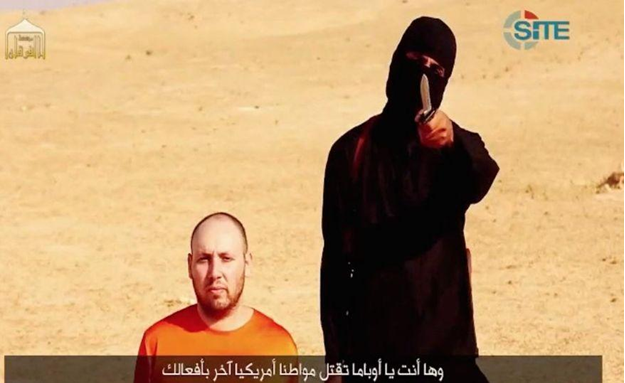Islamic State Militants Execute a Second American Journalist
A video grab of US journalist Steven Joel Sotloff shortly before he was executed by Islamic State

NEW DELHI: The Islamic State, previously known as Islamic State of Iraq and the Levant (ISIL) have reportedly murdered a second United States journalist.
In a video posted to the internet, the militant execute Steven Sotloff, who had been captured in Syria and was being held hostage by the group.
The militants also threatened to kill another captive, David Cawthorne Haines, a Briton.
The release comes a week after the militant group asked for $6.6 million in random for an American hostage who was a humanitarian aid worker and two weeks after a video showed the execution of American journalist James Foley.
For the release of the humanitarian aid worker whose identity has been kept unknown at the request of family members, the militants asked for the release of Aafia Siddiqui - convicted in 2010 for targeting US officials in Afghanistan.
The Siddiqui family issued a statement distancing themselves from the ransom demands. If the issue is true, we would like to state that our family does not have any connections to such groups or actions. We believe in a struggle that is peaceful and dignified. Associating Aafia’s name with acts of violence is against everything we are struggling for.”
“While we deeply appreciate the sincere feelings of those who, like us, wish to see the freedom of our beloved Aafia, we cannot agree with a ‘by any means necessary’ approach to Aafia’s freedom. Nor can we accept that someone else’s daughter or sister suffer like Aafia is suffering,” the letter added.
Further, two weeks ago a gruesome video showed a masked IS militant beheading a kneeling man dressed in an orange jumpsuit, identified as journalist James Foley. The victim was forced to read a statement blaming the US for his murder, with the executioner directly linking his actions to the US President Barack Obama’s order to carry out air strikes in Iraq. The IS took responsibility for the execution, vowing to push through with further actions of revenge, including the execution of Sotloff.
Meanwhile, the United States said that it was prepared to use a variety of options to weaken the IS -- including air strikes, with or without Demascus’ consent.
IS militants have been rapidly gaining territory in Iraq, their advances resulting in a political crisis as pressure mounted on Iraqi Prime Minister Nouri-al-Maliki, who is blamed for pursuing sectarian policies, to resign. Whilst Maliki expressed his acceptance of the candidacy of Haider al-Ebadi and the world found their scapegoat, the IS advance shows no sign of letting up.
The militants are labelled Sunni militants, and their rise attributed to divisive policies by the Shia-dominated administration at the centre. Though sectarianism is certainly a factor, this is an oversimplification, especially as sectarianism was not a factor in Iraq prior to the US invasion of 2003. With the US supporting Shia ethno-political parties and propping them to power, a Sunni identity rooted in the context of victimhood, emerged in Iraq. The US support to Sunni militants fighting the Bashar-al-Assad regime in Syria, which includes IS, further facilitated the group’s rise.



